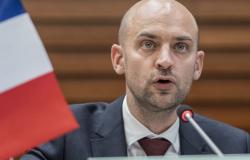Shis lawyer, Me Patrice Spinosi, immediately announced that his client would comply with the sanction but that he would seize “in the coming weeks” the European Court of Human Rights (ECHR). This referral does not, however, prevent the execution of the sanctions imposed.
In this case also called Bismuth, Nicolas Sarkozy, 69 years old, is definitively sentenced for corruption and influence peddling to three years of imprisonment, one year of which is spent under an electronic bracelet. He is also sentenced to three years of ineligibility.
Nicolas Sarkozy must now be summoned – in principle within a period of less than a month – before a sentence enforcement judge (JAP), who will determine the terms of his bracelet, which will be placed later.
This decision comes as the former tenant of the Élysée must appear from January 6, and for four months, at the Paris court, in the case of suspicion of Libyan financing of his 2007 presidential campaign.
In the Bismuth case, the former head of state was, on May 17, 2023, a second time found guilty of having tied up in 2014, alongside his historic lawyer Thierry Herzog, a “corruption pact” with Gilbert Azibert, senior magistrate at the Court of Cassation, so that he can transmit information and try to influence an appeal filed by Nicolas Sarkozy in the Bettencourt affair. And this, in exchange for a “boost” promised for an honorary position in Monaco.
The three men were given the same sentence, with the lawyer banned from wearing black robes for three years.
Claiming their innocence from the start, they filed appeals, raising 20 arguments examined during a hearing on November 6, after which the decision was reserved.
The Court of Cassation also rejected the appeals of Thierry Herzog and Gilbert Azibert, who, in fact, are also definitively convicted.
Before the Court of Cassation, which controls the proper application of the law and not the merits of the cases, the Advocate General methodically recommended the rejection of each point of law raised.
Me Emmanuel Piwnica, lawyer advising Thierry Herzog, criticized a procedure which “should never have seen the light of day”, speaking of a file where “we no longer count the illegalities committed, the breaches, the attacks on fundamental rights”.
The defense insisted on two main points: first, it hopes that a recent decision of the Constitutional Council, dated September 28, 2023 and originating in the Fillon affair, will allow it to obtain a new trial.
In the name of the rights of the defense which must not be “theoretical and illusory”this decision requires a re-examination by a new court of appeal of a request for annulment of the entire procedure, argued Me Piwnica.
For years, the Sarkozy camp has in fact believed that the National Financial Prosecutor’s Office (PNF) has unfairly “hidden” a parallel investigation, aimed at flushing out a mole who would have informed the former President of the Republic and his lawyer that they were being wiretapped.
The lawyers also contested the legality of the wiretapping at the heart of the case, a subject already debated many times in this case.
Me Patrice Spinosi invoked a judgment of the European Court of Human Rights (ECHR) of June 16, 2016: “Nicolas Sarkozy cannot be criminally convicted on the basis of exchanges he had with his lawyer”, because they cannot be “used against him”, he argued.
In 2025, the Court of Cassation will also have to rule on the former president’s appeal against his sentence to one year in prison, including six months in the Bygmalion affair, concerning the excessive spending of his 2012 campaign.





